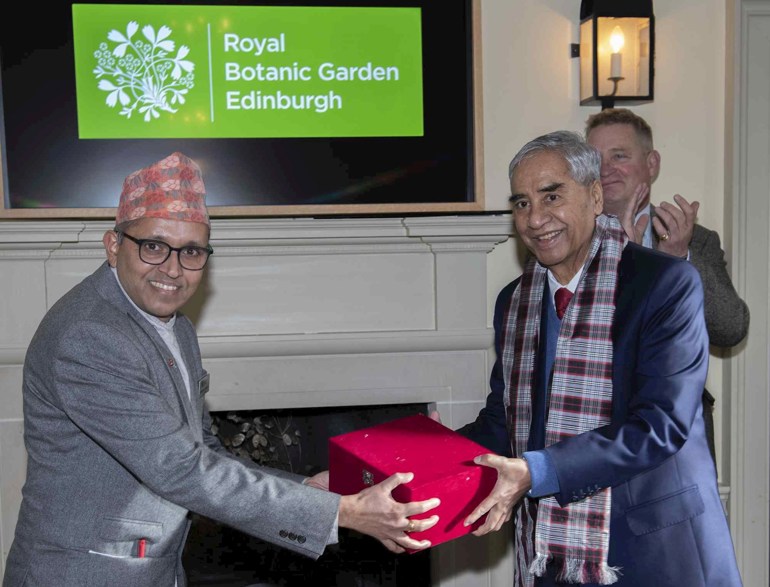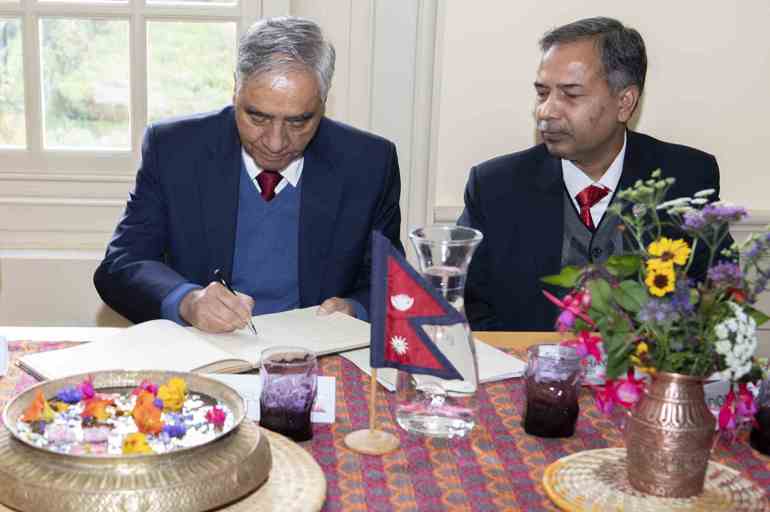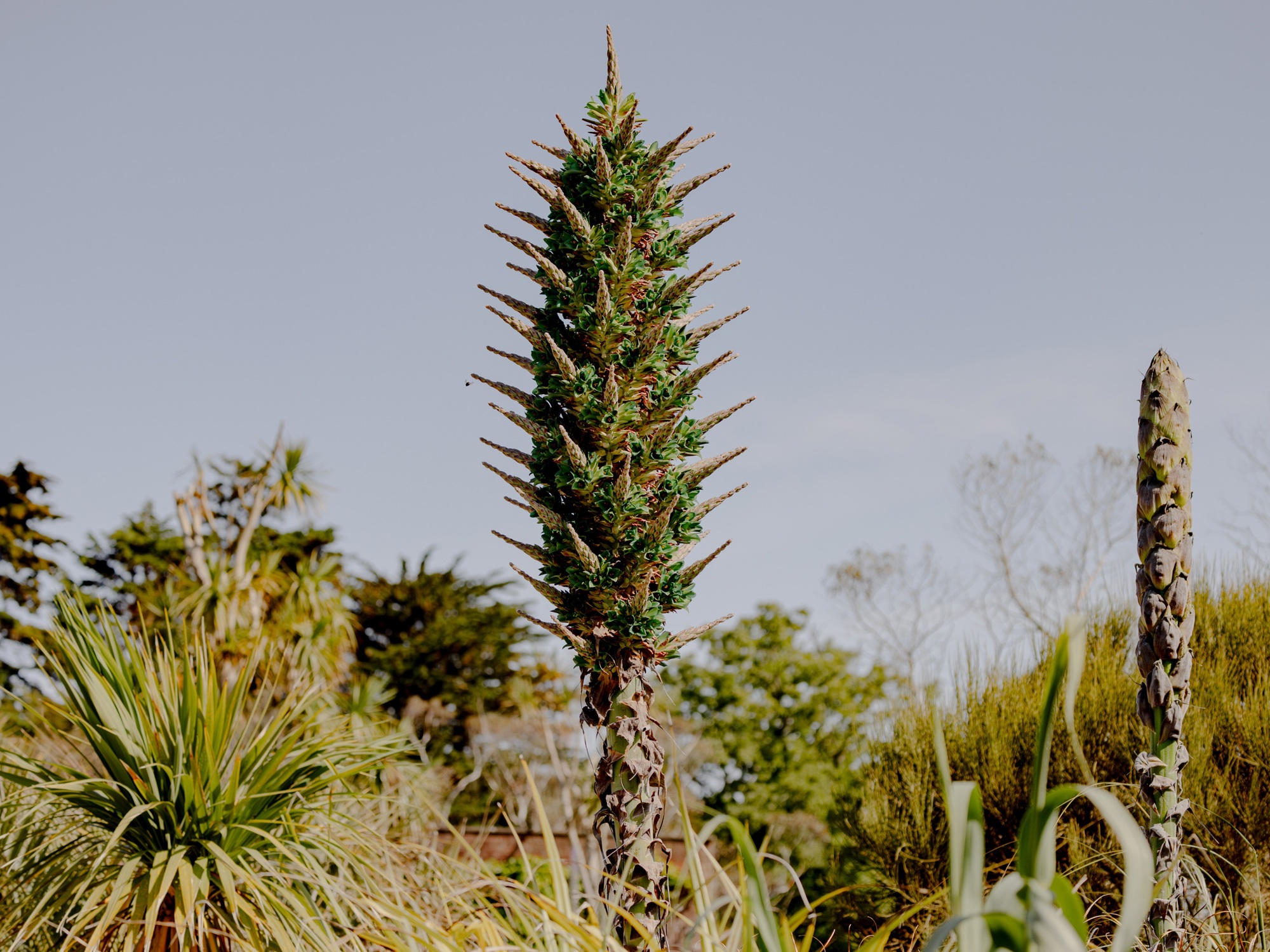Vibrant international partners committed to addressing the impact of the biodiversity crisis and climate emergency in the Himalayan kingdom of Nepal, recently renewed their friendship in Edinburgh. Away from the officialdom of COP26 at Glasgow, Prime Minister Sher Bahadur Deuba of Nepal and his Government concluded their visit to Scotland by calling in to one of their country’s most longstanding partners, the Royal Botanic Garden Edinburgh (RBGE).
Led by Prime Minister Sher Bahadur Deuba and the Minister for Forests and Environment Ramsahay Prasad Yadav, a government delegation was in Scotland to address the Global Leaders’ Summit on the dramatic and damaging effects of climate change, not just upon Nepal but across the entire Himalayan ecosystem and economy.
Turning their attentions to a long-term friend, Regius Keeper Simon Milne MBE, Chair of the Board of Trustees Dominic Fry and a team of scientists and horticulturists dedicated to protecting the biodiversity and sustainability in the hotspot of Nepal, were on hand to welcome them.
At the centre of the Himalaya, Nepal is a country rich in biodiversity, with habitats ranging from tropical jungles to the icy peaks of the world’s highest mountains. Centred in a Global Biodiversity Hotspot, and home to a third of all Himalayan species, Nepal’s ecosystems are crucial to all life across Asia, and sustain the everyday needs of Nepal’s largely rural population. However, the country is experiencing alarmingly rapid melting of glaciers and snow cover of the Himalayan mountains as part of the increasing frequency of extreme weather events, flooding and landslides.
Having worked in the region for more than 200 years, over the last two decades, RBGE has become a yet closer partner of the Nepal government and its key environmental agencies. The work has a sense of urgency and achievability.
Over the last 20 years RBGE has been working with partners in Nepal to address critical knowledge gaps and the lack of technical capacity needed for the effective conservation and sustainable use of Nepal’s natural resources. Centred on the Flora of Nepal – a priority project in Government of Nepal’s National Biodiversity Strategy Implementation Plan – RBGE is assisting Nepali partners in their quest to build their national capacity to undertake plant biodiversity research and to scientifically document the natural capital of their country. The Flora of Nepal will be the first comprehensive record of the estimated 7,000 species of flowering plants and ferns found in Nepal.
From working with government agencies to community groups, RBGE is committed to helping create sustainable answers for this outstanding biodiversity hotspot. This includes working with agencies in Nepal to deliver on its commitments to the Convention on Biological Diversity and to other international agreements. As the international lead on the Flora of Nepal, RBGE is working with the Government of Nepal’s Ministry of Forests and Environment, the Nepal Academy of Science and Technology, and Tribhuvan University, as well as partners in Japan to create the world’s first born-digital e-Flora, providing open access data freely via the project website www.floraofnepal.org.
At grassroots level, the partners are taking the technical data in the Flora of Nepal and providing it in user-friendly formats for communities when managing their plant resources. The bilingual, image-rich Plants and You guides puts high-quality information in the hands of the people who need it the most and empowers them to make informed decisions. Nepal has a highly successful community-based forestry programme, which has increased the area of forested land to 42 per cent of the country. RBGE projects funded by the UK Darwin Initiative have supported community forest user groups to help combat the damaging effects of invasive alien plants – an increasing problem with climate change – and to mainstream biodiversity into their operational plans.
Building on its own 218-year connection with Nepal, RBGE played a major role in the celebration of 200 years of diplomatic relations between the two countries in 2016. Supported by the British Embassy and the Ministry of Forests and Environment, RBGE and colleagues in the National Botanic Garden, Godavari, co-created a Biodiversity Education Garden to raise awareness of the importance of biodiversity in people’s lives. Opened by the President of Nepal, Bidya Devi Bhandari, the BEG is popular with school groups and students, as well as the general public. A major exhibition was launched in Edinburgh and an area of the Inverleith garden was developed showcasing plants from Nepal. Reflecting the close working relationship RBGE has with respective diplomatic missions in London and Kathmandu, Ambassador Durga Subedi inaugurated this special Nepal area which continues to delight and inform visitors on Nepal, its people, and its biodiversity.



